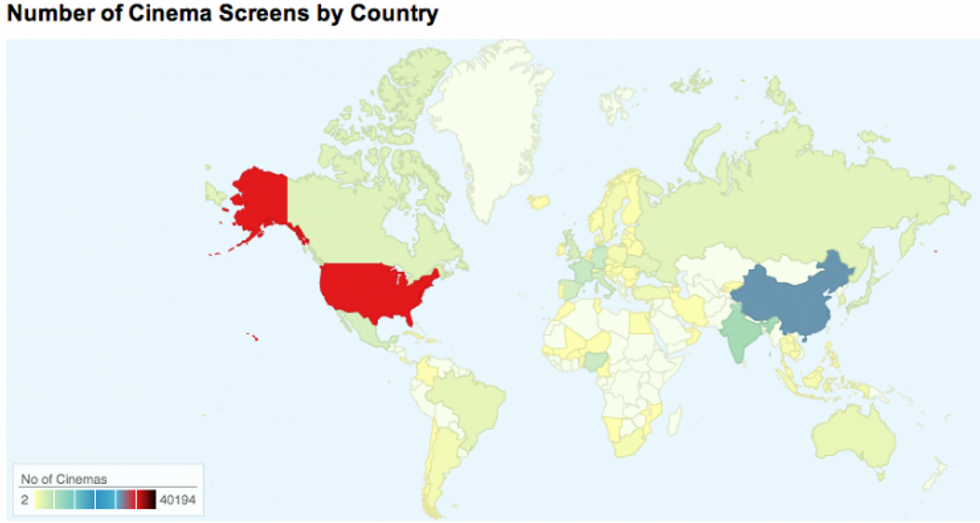Bad Movies are Bad Business: Lynda Obst on This Summer's Flops & How the Industry Can Recover

Hollywood's blockbusters no longer cater towards Americans. That's fairly old news; overseas markets have ruled the box office since Titanic swept international audiences into movie theaters in record numbers for the time. With the majority of modern moviegoers living abroad -- 80% of box office figures, according to veteran producer Lynda Obst -- one might think that a more diverse selection of films would emerge as a result. But as some might have noticed by the slate of mega-movies and sequels this summer, just the opposite seems to be happening. Americans and international audiences agree that this summer's 'hits' were mostly misses, producing box office figures that were, in Obst's words, "pretty catastrophic for the movie business." Why did it take Hollywood over a billion in losses to realize what most sentient earthlings could have told them from the script? Obst describes "the new abnormal in the movie business," and why it's bound to change.
While critics and analysts toss around the blame for recent box office figures, Lynda Obst has risen above the din with a rational explanation for all the chaos. She's been producing successful films in Hollywood for decades, including The Siege, Contact, and Sleepless in Seattle. In 1996, she released her first brilliantly named book on the industry, Hello, He Lied: And Other Truths from the Hollywood Trenches. More recently, she spotted the trend of internationally geared, action-packed and substance-starved movies years before her peers -- enough time to write a book about the phenomenon while her colleagues produced movies exemplifying it. Obst talks about the trend and the book, Sleepless in Hollywood: Tales from the New Abnormal in the Movie Business, with Studio360's Kurt Anderson:
In the interview, Anderson characterizes the summer sequel syndrome as a fear-based formula designed to snatch allowance money from the undiscerning youth of the world. Unfortunately for the studios who "doubled down on blockbusters this summer as never before," the formula failed: "In the past few months, maybe a billion dollars worth of movie making (The Lone Ranger, After Earth, White House Down, The Wolverine, Pacific Rim, Smurfs 2) totally bombed in America."
While some tentpoles did turn profits, many fell short of studios' predictions, and indie breakouts were hard-pressed to get noticed amidst the explosions. Obst explains that in an industry catering to audiences outside of the domestic market, "you wanna give the rest of the world what they want."
Which brings us to the billion-dollar question: what does the rest of the world want?
Box Office Prophesies
This interactive graph of the number of cinema screens by country sheds a bit of light on the studios' focus when faced with this question. Although these numbers should be taken with a grain of salt (I'm pretty sure I personally saw more than three cinema screens in Namibia,) the general trend is clear: outside of the US, China kills it. And regardless of what Chinese audiences want to see coming from the US, only certain movies make the cut. Obst explains:
Russia and China won't even open our [original, independent] movies -- In the quotas from China, they literally will only let in 3D and IMAX movies by law and design. It's not that the studios are guessing that that's all that the big markets want. They're being told that that's all the big markets want -- [So] we're not there to exchange cultural nuance. Our movies aren't there for that. Our movies are there to showcase our fabulous technology.
For a number of reasons (Anderson suggests foreign markets want to "protect their domestic Sleepless in Seattle movies" and Obst suggests "they don't want the infiltration of our ideas,") Hollywood is only getting certain movies on the big screen abroad. Hence, studios put their money on mega-movies and special effects this summer -- to such an overwhelming extent that "Google Blockbuster" boiled the art of moviemaking down to a science in case anyone missed the trend:
Wikipedia, Twitter and the real Google have also been recently used to predict box office returns -- and I'm pretty sure my 7-year-old cousin made some accurate prophesies this summer as well. Turns out it's not very hard with the latest releases; explosions, stars and special effects don't make up for weak plot points in any language.
Luckily, Obst says that the industry is agile, and will learn from its mistakes. "[Hollywood is made up of] a very reactive, bright crew of people." Next summer's tentpoles might not change drastically at this point since they're already in the pipeline, but the industry will adapt in the long term:
"I see in development more originals this year. That, I hope, the studios will see as an opportunity to (instead of making the one marginal tentpole for $250 million...that feels somewhat familiar but everybody kind of thinks 'Hm this could work in Hong Kong...') Dump that one and make five smaller movies, and save a little money for development next year to buy a great script."
"The New Abnormal in the Movie Business"
Obst further explains the changes in the industry over her 30-year career as a producer in her earlier interview on the Leonard Lopate Show.
In the interview, Obst gives a list of the films she made during her career, which she could not currently secure funding to produce if they were in development now. The model has changed as studios set their sights abroad, and the subtleties of a script are no longer center stage.
For starters, she says films are rarely pitched anymore, and the focus of a pitch has entirely changed:
Pitches are dead. That's part of the old abnormal. We used to be able to go into a room and pitch a movie, and if it was a great idea and it seemed fresh and it was high concept, we could sell it. Now if you want to pitch an idea, you need a full presentation of a one sheet, a graphic novel or some kind of thing that pretends to be an IP, which is an intellectual property -- we used to call those 'books' -- but now we call them IPs like The Hunger Games or the Twilight Zone -- What you would probably do is say 'I have Liam Neeson attached to that, who is a big international star -- I can sell this in China -- I have tons of special effects and I have a gigantic automobile that changes into a monster, and then it changes back into a vampire.'
As Obst highlights, pre-awareness (a successful book or celebrity attachment) rules the game like never before. What happened in the past few decades to cause the shift?
Obst explains that when she first entered the industry, the international market made up 20% and the domestic market made up 80% of box office returns -- those numbers have now flipped. DVDs comprised half of a film's profits in the old days, which Obst says "paid for our interstitial movies, our one-offs, our nuanced movies, our movies about writing." With the collapse of DVD revenues, the international market has come to replace a vital piece of Hollywood's pie. Studios fell back on foreign quota requirements and tested the limits of the blockbuster market this summer -- and we've seen the results.
For some films, it works. But as an industry formula, it seems that we're drastically underestimating international audiences. The 'emerging markets' are not devoid of visual subtlety or nuanced scripts (anyone who thinks otherwise should check out India's Chatrak by Sri Lankan Director Vimukthi Jayasundara, or Wong Kar-wai's Chunking Express). Alas, Obst explains that this is just the reason Hollywood studios have backed into the action-extravaganza pigeonhole:
Suddenly movies that were culturally nuanced -- dependent on the American sense of humor, on our mating rituals -- played less well when we had the emerging markets [as our main audience] than when our international markets were primarily European -- [Emerging markets] wanted from their own filmmakers culturally nuanced films that were based on their country’s mores and habits and mating rituals.
It should be no surprise that emerging market audiences are used to high-quality stories from their own shores. And of course, the proliferation of Hollywood-sized special effects need not accompany the dumbing-down of feature scripts. It should be fully possible for modern mega-movies to capture global audiences in the same way Titanic(or as Obst puts it, "Romeo and Juliet on a ship") did in the first place.
With "our fabulous technology" alongside a healthy appreciation of audience IQ, mainstream US studios shouldn't have to sacrifice box office numbers to meet foreign quotas. Unlike special effects mega-movies, the market for well-developed stories is impossible to saturate.
We've got a fairly international readership here at NFS; how do those in so-called 'emerging markets' feel about Hollywood's latest tentpoles? Are mainstream US studios underestimating international audiences and paying the price? Or is the "summer movie crisis" a necessary growing pain in the rapidly changing global marketplace?
Images:
[World Map image by Flickr user polasso]
[Lynda Obst image -- New York Social Diary]
['Box office flops' image --Zap2It]
[Chunking Express image -- Movie Mail]















